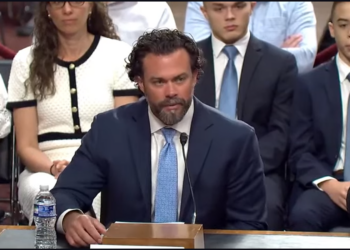China is one of America’s largest trading partners, so it’s no surprise that businesspeople from the United States often travel there to make deals or connections. But for many Americans of Chinese ethnicity, it’s not so easy to leave China once you’re there.
A Commerce Department employee who works at the U.S. Patent and Trademark Office is currently banned from leaving China. “US Commerce Secretary Howard Lutnick condemned China’s move,” reports Bloomberg, and “said the Trump administration is working to resolve the situation.”
In another case, a Shanghai-born managing director at Wells Fargo named Chenyue Mao was subjected to a Chinese exit ban in recent weeks. According to The Wall Street Journal, “An automated reply from her corporate email account said she was traveling internationally on business. The reason for her travel to China couldn’t be determined. Mao attended an industry conference in Brazil in late June, according to a news release from the event. It couldn’t be determined precisely when Mao entered China, or what prompted the travel restriction. Wells Fargo has suspended all travel to China following Mao’s exit ban.”
China’s Foreign Ministry claims that Mao is under criminal investigation, but there is no information available about the charges. The Washington Post reports, “While the reasons for the criminal investigation into Mao remain unclear, experts say that exit bans and criminal investigations can sometimes be used as a way to create leverage to use against adversarial parties, such as particular businesses or the United States.”
There could be legitimate reasons why China might detain people with connections to the U.S. government or businesses, but the mystery surrounding these cases raises questions about China’s motives. According to several sources, the cases are becoming more common. Financial Review reports, “Experts and affected individuals said exit bans were being applied by a broader set of Chinese authorities. In some cases, cash-strapped local governments have detained and fined business executives, a practice known as ‘long-range fishing.’” That’s also called extortion.
The Washington Post also highlights the increase in this happening, “John Kamm, chairman and founder of the Dui Hua Foundation, said he is aware of at least 30 active cases of Americans under visa bans. He added that he suspects the number could be as high as 50, with cases on the rise. At times, Kamm said, he is alerted to as many as two new cases per month. Many, he said, involve local disputes targeting businesspeople.”
Business executives traveling abroad may want to take note of the lack of clarity involved when they find themselves part of an exit ban. “There are at least several dozen Americans, many of them ethnic Chinese, who are under exit bans, experts and former officials said,” the Post relates. “The exact number is difficult to ascertain because typically these cases come to the attention of U.S. authorities through self-reporting, and most do not learn they’ve been placed under a ban until they try to leave, or they don’t want to call attention to the case and make resolution more difficult.”
One Chinese immigrant gets to the point. “These cases raise serious concerns about employee safety and operational stability for foreign companies in China,” writes Helen Raleigh at The Federalist. “China’s exit ban process is arbitrary and undisclosed. Targeted individuals often receive no prior notice. This lack of transparency means travelers often remain completely unaware of their status until they attempt to leave China, resulting in shock and confusion.”
Raleigh adds, “Compounding the issue, the exit ban is frequently the precursor of illegal detention. Those barred from leaving may find themselves imprisoned on baseless charges. Their legal rights, including the fundamental right to legal representation, are routinely ignored and egregiously violated. The Chinese government obstructs access to consulates, making it even harder for foreigners to seek help. Adding to the distress, the Chinese Communist Party rarely informs families or employers about the reasons for these bans or how long they will last, leaving many in a state of confusion and worry.” This has all the sounds and smells of a soft-hostage situation.
The U.S. Department of State has taken notice, issuing a China Travel Advisory that warns, “The PRC has also interrogated, detained, and expelled U.S. citizens living and working in the PRC. U.S. citizens traveling or residing in the PRC may be detained without access to U.S. consular services or information about their alleged crime. U.S. citizens in the PRC may be subjected to interrogations and detention without fair and transparent treatment under the law.”
Although the exit ban seems like a separate issue, it’s part of a broader pattern of unusual and troubling behavior by the Chinese government both in China and here in the U.S. In recent years, citizens and political leaders have grown alarmed over the COVID-19 cover-up, China’s theft of intellectual property, Confucius Institutes at our colleges and universities, the purchase of hundreds of thousands of acres of land in the U.S. (some near strategic military or technological facilities), and turning homes in small-town America into drug manufacturing facilities. And how can we forget the mysterious Chinese spy balloon incident?
As the U.S. continues to negotiate with China on a range of issues important to both countries, it’s critical for the Trump administration to draw more attention to these exit bans and demand not only transparency but an end to them. If American business leaders can’t feel safe traveling to China and leaving when their business is done, maybe that’s all the more reason to bring that business back to America.
















